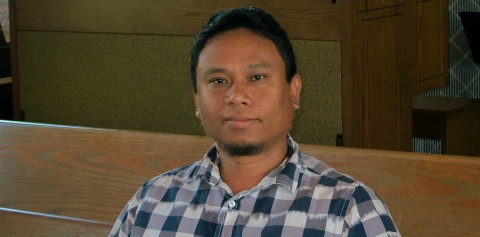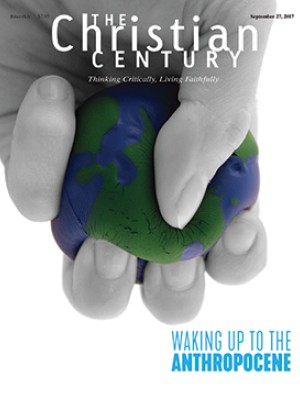Karen refugees revitalize two mainline churches, inspire film All Saints
Ye Win, now an Episcopal lay minister, paid forward the help he received when he reached the United States from Burma.

After a split over theology in the 1990s, there were only 12 members of the congregation left at All Saints’ Episcopal Church in Smyrna, Tennessee, a suburb south of Nashville. The church couldn’t pay its mortgage. By 2007, the church was in danger of closing.
Today, 130 to 150 parishioners attend Sunday services. Many worshipers filling those pews are Karen refugees, an ethnic minority from Burma (called Myanmar by its military government). The church has paid off its mortgage and has a community farm.
Read our latest issue or browse back issues.
At All Saints’, it was the refugees who saved the Americans.
Los Angeles film director Steve Gomer found the transformation of this struggling southern congregation so inspiring that he moved his family to Nashville to create a fictionalized film about it. The Sony Pictures movie All Saints opened August 25 in 800 theaters nationwide.
“The real story is remarkable; we had to change very little to make it dramatic,” Gomer said. “You have these extraordinary people who went out of their way to say, ‘Yes, we’re here. Let’s form this community.’ I think the picture is moving but honest. It’s not saccharine.”
A lifelong Anglican, like many Karen, Ye Win and other refugees showed up at the church in 2007, asking to farm some of the church’s 20 acres to feed their families. More than 100,000 Karen live in a refugee camp on the border of Thailand and Burma. The ongoing civil war has earned them refugee status in the United States. As refugees, they receive government support for three months. After that, they’re largely on their own.
In the film, as in real life, businessman-turned-pastor Michael Spurlock had arrived recently at the church when Win showed up. Spurlock had planned to close the struggling church. But the Karen people’s farming of spinach, sour leaf, and other foods not only fed their families, it helped the congregation. They were able to sell the extra crops at nearby markets to help pay the church’s bills, and everybody pitched in with the work.
To research the film, Gomer attended services and family dinners. He participated in pastoral duties, such as transporting Karen people to doctor’s appointments and tutoring. Gomer is Jewish and active in his synagogue, and he’d been interested in doing a film showing the difficulties clergy members experience.
“At dinner at Ye Win’s house, my wife and I realized we were sort of in a time machine: we were sitting with our great-grandparents from Russia, who had a very similar experience in the 1890s as refugees and immigrants,” Gomer said. “That’s who the United States is. . . . This is our story, and it’s any refugee’s story, although there are special circumstances in this story to make it even better.”
These days, there’s one Sunday service with the homily preached in both languages, as are the prayers and hymns.
Lisa Lehr moved to Smyrna in 2013. She wasn’t Episcopalian but decided to join the church after a Karen woman from All Saints’ hugged her on Palm Sunday in 2014.
“They made me feel like I was there with them, that they were my community, or they could be my community if I accepted it, and I did,” said Lehr, a volunteer Christian educator and now a member of the All Saints’ Mission Council.
Win, the son of an Anglican missionary, is now a full-time Episcopal lay minister. He helps fellow refugees in the Smyrna area find work, navigate social services, and get settled in their new home.
Before Win helped give All Saints’ its new start, his family got its start in the United States with the sponsorship of Rhems United Methodist Church in New Bern, North Carolina.
“When I was in the United Methodist church in North Carolina, the families of the congregation helped me,” Win said. “When I got to Tennessee, I helped other families. I believe that was God’s plan.”
Win and his pregnant wife arrived in North Carolina in 2004, and they did not know anyone in town. They needed a friend, and they found one in Helen Dawley, a retired teacher involved with Rhems United Methodist and in Interfaith Refugee Ministry, an affiliate of Episcopal Migration Ministries.
Not long after she joined the church, Dawley asked if the United Methodist Women would be willing to sponsor one of two newly arrived refugee couples, providing them with transportation and other support until they got on their feet.
“I had time and a car,” said Dawley, who is now 91.
The congregation, which was mostly older people, ended up sponsoring both the Win family and another couple.
For Win, the most meaningful times with the Rhems congregation were the congregation’s monthly Holy Communion services. He and his wife barely knew English at the time, so they didn’t understand the preaching or the hymns. But Eucharist they understood.
Ultimately, the young family decided to move to suburban Nashville at the encouragement of a fellow refugee. Thinking of his daughter’s future, Win said he wanted to live closer to universities. Having lived in Bangkok for years, he also missed city life.
Although the Win family moved on, today Rhems buzzes with the energy of young families, most of whom are Karen refugees or the children of Karen refugees. Its choir can fill the front of the church, and its youth group of about 20 teens can fill multiple pews.
“Every Sunday, I look out and think, ‘This is a miracle,’” said Connie Stutts, the church’s pastor. “I can’t believe I get to be part of this.”
A version of this article, which was edited on September 8, appears in the September 27 print edition under the title “Karen refugees revitalize two mainline churches, inspire film All Saints.”




